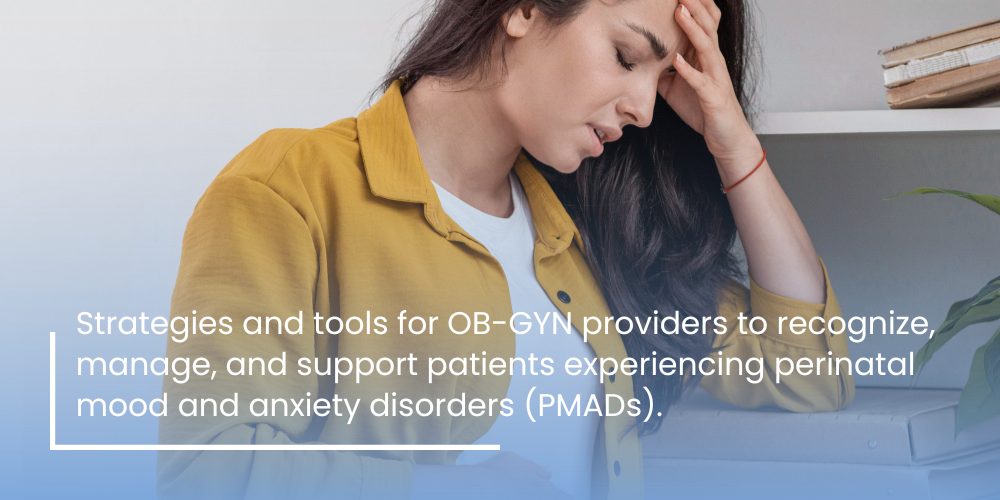Addressing Perinatal Mood and Anxiety Disorders in OB-GYN Practice
What Are Perinatal Mood and Anxiety Disorders (PMADs)?
Perinatal Mood and Anxiety Disorders (PMADs) affect up to 1 in 5 women during pregnancy and postpartum. Early recognition is key to better outcomes.
Prenatal Depression
Persistent sadness, fatigue, or hopelessness during pregnancy. Often overlooked, it can lead to poor self-care, missed appointments, and low birth weight if left untreated.
Key Signs: Low energy · Tearfulness · Trouble bonding with baby bump
Postpartum Anxiety
Excessive worry, restlessness, or racing thoughts after delivery. Not just “new mom nerves,” it can interfere with sleep, decision-making, and bonding.
Key Signs: Constant worry · Panic attacks · Obsessive behaviors
Postpartum Depression
A deeper, longer-lasting sadness following childbirth. Beyond “baby blues,” this affects how a mother feels, thinks, and interacts with her baby.
Key Signs: Guilt · Withdrawal · Feeling overwhelmed
"OB-GYNs are often the first line of support. Awareness = early help."
This blog explores the risk factors associated with PMADs, treatment strategies, and how Electronic Health Records (EHR) software tailored to OB-GYN clinics can enhance care.
Risk Factors Associated with PMADs
To provide proactive care, understanding the risk factors for PMADs is essential for OB-GYN practices.
Research highlights several key factors associated with prenatal depression and anxiety:
- Lack of partner or social support
- A history of abuse or domestic violence
- Personal history of mental illness
- Accidental or unwanted pregnancy
- Adverse life events and high perceived stress
- Current or past pregnancy complications
Studies, including those by Biaggi et al., indicate that these factors significantly contribute to the development of PMADs. Recognizing these risks allows OB-GYNs to offer targeted support and interventions, mitigating the potential impact on patients.
Treating/Addressing Mental Health and Pregnancy
Addressing mental health during pregnancy requires a comprehensive approach. As OB-GYN practitioners, you can adopt various strategies to support pregnant women experiencing PMADs, providing a sense of reassurance and confidence in your practice.
The American College of Obstetricians and Gynecologists (ACOG) provides a valuable toolkit for perinatal mental health. This toolkit offers guidelines and resources for healthcare providers, including screening tools, treatment algorithms, and patient education materials, to better support women’s healthcare.
Effective treatment plans often include:
- Screening for PMADs during prenatal visits
- Providing education on mental health and available resources
- Offering counseling and therapy options
- Coordinating care with mental health specialists
- Encouraging peer support groups
By integrating these practices, OB-GYNs can create a supportive environment prioritizing mental and physical health.
How EHR Software Specific to OB-GYN Clinics Can Help Address PMADs
Implementing specialized EHR software in OB-GYN clinics can significantly enhance the management of PMADs.
Here are some features that can aid in addressing these disorders:
Easy Access to Medical Records
EHR software designed for OB-GYN practices significantly enhances patient care by providing comprehensive and easily accessible medical records. This centralized system empowers you, the healthcare providers, to coordinate care more efficiently, ensuring that all aspects of a patient’s health, including mental health, are addressed holistically.
EHR systems integrate medical history, treatment plans, and patient notes in one place, facilitating a more thorough understanding of each patient’s unique needs, leading to more personalized and effective care.
Customized Alerts for Tracking Patient Health and History
EHR systems enable OB-GYNs to set up customized alerts to monitor patients at higher risk of perinatal mood and anxiety disorders. These alerts can remind healthcare providers to conduct mental health screenings and follow up on any concerns promptly.
By having a system that flags potential issues early, OB-GYNs can intervene sooner, providing timely support and reducing the risk of severe mental health complications for their patients.
Real-Time Alerts
Real-time alerts within EHR systems are crucial for the immediate management of PMADs. These alerts can notify providers of significant changes in a patient’s condition, such as elevated stress levels or signs of depression, enabling prompt action. This feature is particularly beneficial for managing the dynamic and sometimes unpredictable nature of PMADs, ensuring that healthcare providers can respond quickly to any emerging issues and provide the necessary support.
Interoperability, Integration, and Cloud Features
Modern EHR systems offer interoperability and integration with other healthcare systems, facilitating seamless patient information sharing across providers and specialties.
Cloud-based features ensure patient data is accessible anytime, anywhere, allowing for continuous monitoring and support. This connectivity is essential for comprehensive care, enabling OB-GYNs to collaborate effectively with mental health professionals and other specialists involved in a patient’s care.
Virtual Support
Telehealth capabilities integrated into EHR software enable OB-GYNs to offer virtual consultations and mental health support. This is especially valuable for patients who may have difficulty attending in-person appointments due to mental health challenges or other barriers.
Virtual support allows for continuous care and monitoring, allowing patients to receive the help they need from the comfort of their homes. This accessibility can be crucial in managing and supporting mental health during pregnancy and the postpartum period.
Improve Your OB-GYN Practice with digiCharts
Enhancing your OB-GYN practice with digiCharts, an advanced EHR software, can revolutionize the way you manage perinatal mood and anxiety disorders.
digiCharts offers a suite of features tailored specifically to OB-GYN practices, ensuring high-quality care and efficient patient management. From comprehensive patient records and customizable alerts to real-time notifications and seamless integration with other systems, digiCharts provides the tools necessary to improve patient outcomes and streamline practice operations.
By adopting digiCharts, you can offer your patients the best possible care and support during
one of the most critical periods of their lives.
By addressing the mental health needs of pregnant women and new mothers, OB-GYN practices can play a pivotal role in promoting overall well-being and fostering positive outcomes for families. Implementing effective strategies and leveraging advanced EHR software are key steps in achieving this goal.
"Support Her Whole Journey — With an EHR That Goes Beyond Checkups" Visual:
Resource Links for PMADs
Mental Health Organizations:
Support Groups:
Further Reading:





